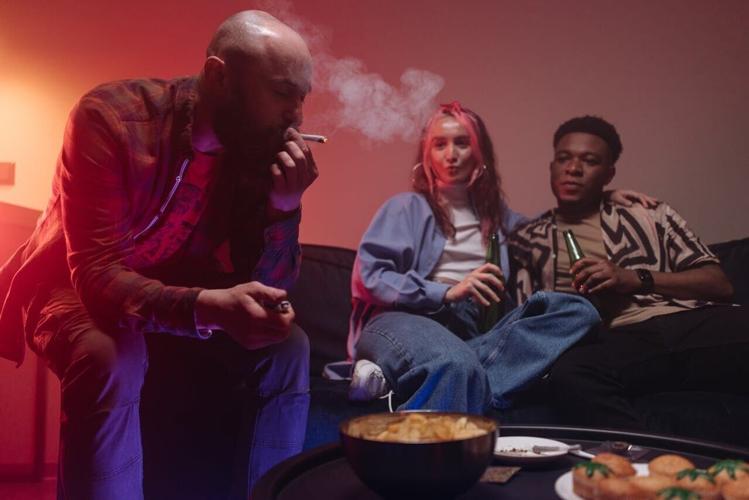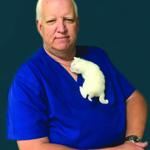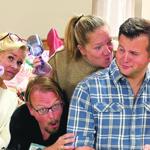
Photo by Inga Seliverstova via Pexels
By Stephen Beech
Boozy weekends can trigger a newly identified sleep disorder, according to a study.
Burning the candle at both ends, drinking and smoking through Saturday and Sunday, may be doing more than disrupting Monday mornings, say scientists.
Researchers found wild weekends may cause a disorder labeled "‘social apnea."
It refers to the weekend spike in obstructive sleep apnea (OSA) severity, driven by lifestyle choices and irregular sleep patterns.
OSA is a common sleep disorder affecting around one billion people worldwide.
It is caused by repeated airway collapse during sleep and, if untreated, increases the risk of heart disease, diabetes, cognitive decline, depression, and even death.
An international research team, led by sleep experts from Flinders University in Australia, analyzed data from more than 70,000 people worldwide for the new study.
The researchers found a "consistent and significant increase" in OSA severity on weekends.
They coined the term "social apnea" to describe the phenomenon.

Photo by Pavel Danilyuk via Pexels
Study lead author Dr. Lucia Pinilla, of Flinders University, said: “Sleep apnea is already a major public health issue, but our findings suggest its true impact may be underestimated.
“Most clinical diagnostic testing is done on a single night, typically a weeknight, missing the weekend effect we’re now calling social apnea.”
Dr. Pinilla explains that the weekend surge in sleep-disordered breathing may heighten the risk of serious health conditions, including heart disease, depression, dementia, and extreme fatigue as well as road and other accidents.
The study, published in the American Journal of Respiratory and Critical Care Medicine, found that participants were 18% more likely to have moderate to severe OSA on weekends when compared to mid-week.
Changes in sleep schedules, such as staying up late on weekends or sleeping in, worsened sleep apnea.
Sleeping an extra 45 minutes or more on weekends increased the risk of worse sleep apnea by 47%.
Men were 21% more likely to be affected, compared to a 9% increase in women.
People under the age of 60 had a 24% higher risk on weekends, compared to 7% in those aged 60 and above.
Study senior author Professor Danny Eckert, also of Flinders University, says the study is the first evidence that OSA severity increases at the weekend.

Photo by Maurício Mascaro via Pexels
He said: “We don’t yet know exactly why, but alcohol use, lighter sleep, and less consistent use of OSA therapies likely play a role."
Dr. Bastien Lechat, lead author of a separate article recently published in the journal Communications Medicine, believes similar mechanisms may drive seasonal variability in OSA severity.
He said: “OSA tends to be worse during summer and winter, with severity increasing by 8% to 19% compared to spring and autumn.
“This seasonal spike is partly explained by higher temperatures, which disrupt sleep and lead to lighter sleep stages which is associated with worse OSA.
"In winter, longer sleep and later wake up times, increase time spent in REM sleep, which is also linked to more frequent apnea events.”
Professor Eckert says that the findings align with the concept of "social apnea" and highlight the need for multi-night sleep assessments and more "personalized" approaches to diagnosis and treatment.
He said: “Relying on a single-night sleep study may miss important variations, leading to underdiagnoses or misclassification of OSA severity."
Professor Eckert recommends maintaining a regular sleep routine to combat "social apnoea."
He added: “Try to keep the same sleep schedule throughout the week and weekend, ensuring that you get the recommended seven to nine hours of sleep a night.
“Keeping a fixed wake-up time and using your prescribed OSA therapy, even on weekends, and going to bed when you feel sleepy will help ensure you frequently get enough restorative sleep, which can help combat the weekend spike in OSA.”























(0) comments
Welcome to the discussion.
Log In
Keep it Clean. Please avoid obscene, vulgar, lewd, racist or sexually-oriented language.
PLEASE TURN OFF YOUR CAPS LOCK.
Don't Threaten. Threats of harming another person will not be tolerated.
Be Truthful. Don't knowingly lie about anyone or anything.
Be Nice. No racism, sexism or any sort of -ism that is degrading to another person.
Be Proactive. Use the 'Report' link on each comment to let us know of abusive posts.
Share with Us. We'd love to hear eyewitness accounts, the history behind an article.